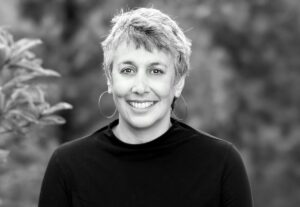Our new students include an underwater photographer, a self-proclaimed “investigator of oddities,” and an “archaeologist of the weird.” Some have experience — at a hip-hop magazine, at a public radio station, in television and at community newspapers — while for others, this day marks a momentous shift in their studies and careers.
These 66 future leaders of 21st-century journalism are a diverse crew. Nearly one-third of them are arriving from abroad, from places like China and Taiwan, Palestine and Paris, Argentina, Uruguay, Canada and Greece. Others are coming from just down the road — Vallejo, Redwood City, San Francisco — and we have a larger percentage than usual from outside California.
“This school has the best training and experience in modern and innovative journalism,” says Alice Kantor (’16), who’s been studying statistics at a French engineering school but dreams of editing the Asia section of a newspaper. “I feel like, with the J-School, I’m already a few steps ahead!”
We are “eagerly charting new directions,” as Dean Edward Wasserman put it. He promises a J-School that will, by commencement ceremonies in 2016, be different from and even better than the one students enter this week.
“We converted our newsrooms to nimble, collaborative workspaces,” Wasserman told the incoming class. “These are not just cosmetic changes. These are meant to enable a different kind of pedagogical, instructional and creative interaction.
“These physical changes, I want you to understand, are emblematic of a ravenous appetite to self-reform. That is key to the character and key to the personality of this school,” Wasserman continued. “If it ain’t broke, but can be made better, we try to make it better.”
The immersion begins now
The Class of 2016 got to know its surroundings in the Berkeley hills with tours of the writing, broadcast, multimedia and investigative facilities during orientation week in late August. Students also joined Professor Jon Else and Peter Nicks (’99) in a discussion of Nicks’ award-winning, character-driven documentary “The Waiting Room.”
We set professional expectations right away with an introduction to inclusive reporting, a new course this fall.
At a career planning workshop, a networking reception, even during their group photo, incoming students met leaders in journalism. World-famous whistleblower Daniel Ellsberg, in conversation with our investigative program Chair Lowell Bergman, discussed his book, “Secrets: A Memoir of Vietnam and the Pentagon Papers.”
Berkeley values
“One of the reasons I came here is because it’s Berkeley,” Wasserman said, “and I suspect it is the reason you’re here too. It’s in the DNA of this university … a powerful commitment to social betterment. You’re here to learn how to make a living, and to make a difference.”
“Elsewhere, this is seen as naÌøve and idealistic. We do not apologize for this,” Wasserman insisted. “If you don’t want to make the world a better place, there are plenty of other ways to make a living. If you want to be a source of illumination, a combatant in the struggle for justice and human progress, this is the place for you. I welcome you.”
Upcoming Events
Dean's Newsletter

October 17, 2024
Berkeley Journalism Quarterly Newsletter
Fall 2024 Dear Berkeley Journalism Community, In mid-September, I stepped in as acting dean at UC Berkeley Journalism when Dean Geeta Anand took leave for the semester. While I…

Quarterly Newsletter From Dean Geeta Anand
March 27, 2024

Quarterly Newsletter from Dean Geeta Anand
June 15, 2023
